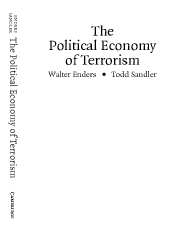Book contents
- Frontmatter
- Contents
- List of Tables and Figures
- Preface
- 1 Terrorism : An Introduction
- 2 The Dilemma of Liberal Democracies
- 3 Statistical Studies and Terrorist Behavior
- 4 Counterterrorism
- 5 Transference
- 6 International Cooperation : Dilemma and Inhibitors
- 7 Hostage Taking
- 8 After 9/11
- 9 The Economic Impact of Transnational Terrorism
- 10 Homeland Security
- 11 The Future of Terrorism
- References
- Author Index
- Subject Index
2 - The Dilemma of Liberal Democracies
Published online by Cambridge University Press: 06 July 2010
- Frontmatter
- Contents
- List of Tables and Figures
- Preface
- 1 Terrorism : An Introduction
- 2 The Dilemma of Liberal Democracies
- 3 Statistical Studies and Terrorist Behavior
- 4 Counterterrorism
- 5 Transference
- 6 International Cooperation : Dilemma and Inhibitors
- 7 Hostage Taking
- 8 After 9/11
- 9 The Economic Impact of Transnational Terrorism
- 10 Homeland Security
- 11 The Future of Terrorism
- References
- Author Index
- Subject Index
Summary
A liberal democracy rules by the mandate and wishes of its citizens. Periodic elections place candidates into legislative and executive offices based on some voting rule, such as a simple majority or plurality of votes cast. The political system may be two-party majoritarian, proportional representation, or some similar system. The “liberal” adjective underscores that the system preserves the civil and political rights of citizens and foreign residents (see Doyle, 1997). In a well-functioning liberal democracy, the political and civil rights of the minority are protected by the ruling government. The press is allowed to report the news, and everyone has the right to express his or her views. As a result, people can criticize the government and its policies without fear of reprisals. Suspected criminals have civil rights – for example, to be charged with a crime, to obtain counsel, and to have a fair trial. Election results are tallied in an open and accurate fashion. When a government loses an election, it relinquishes office and allows for a peaceful and orderly transition of power.
An essential requirement of a liberal democracy is the protection of its people's lives and property. A government that fails to provide this security will lose support and be voted out of office. If, for example, a liberal democracy is unable to control a terrorist campaign that murders innocent individuals on city streets or on public transit, then the government will appear inept and lose popularity.
- Type
- Chapter
- Information
- The Political Economy of Terrorism , pp. 24 - 51Publisher: Cambridge University PressPrint publication year: 2005

